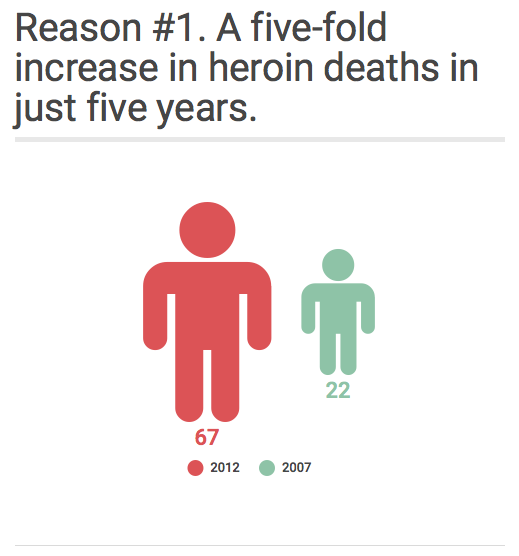News / Health & Wellness
President Obama Initiates Drug Prevention Discussions in West Virginia
Do you want President Obama To Initiate Drug Discussions In Your State?

President Obama paid a visit to West Virginia to discuss addiction prevention. The people of West Virginia have suffered from prescription pain medication for the last several years. Now, they are afflicted with the heroin epidemic. The following statistics, according to Time.com and National Public Radio (NPR), may explain why the mountain state is the perfect backdrop for the president to initiate addiction prevention talks:
 Heroin overdose deaths jumped from 22 in 2007 to 67 in 2012, according to the latest available figures from the West Virginia Health Statistics Center.
Heroin overdose deaths jumped from 22 in 2007 to 67 in 2012, according to the latest available figures from the West Virginia Health Statistics Center.


West Virginia is facing drastically increasing rates of both hepatitis C virus (HCV) and hepatitis B virus (HBV), an epidemic of viral liver diseases that is largely fueled by a growing number of prescription opioid drug and heroin users across the state, the West Virginia Gazette reports.
Do you know the numbers in your state? Find out here…
According to Time.com, heroin-related deaths nearly tripled in the United States within the past three years. Following this upsurge is an increase in the new cases of Hepatitis B and C.
In September of 2015, the Centers for Disease Control and Prevention (CDC) initiated a “Prevention Boost Program” and selected 16 states to receive funding. This program is designed to assist states in setting policy to mitigate overdose deaths. Over the next four years, the CDC is going to give the selected states annual awards between $750,000 and $1 million to advance prevention in four key areas:
2. Implementing Community or Insurer/Health Systems Interventions
3. Conducting Policy Evaluations
4. Developing and Implementing Rapid Response Projects
Is your state included in this program? Find out more:
The U.S. Department of Health and Human Services (HHS) has also taken an active role in trying to reduce the overdose epidemic. In March of 2015, HHS Secretary Sylvia Burwell announced an initiative at reducing opioid and heroin overdose deaths. This action includes:
• Training and educational materials, to include guidelines and materials that will help health professionals make smart decisions and allow the to approach the overprescribing of opiates.
• Expanding the use of naloxone, and supporting this life-saving drug, can and will help the fight over the number of deaths associated with prescription opioid and heroin overdose.
• Increasing the use of Medication-Assisted Treatment (MAT), a comprehensive way to address the needs of individuals that combines the use of medication with counseling and behavioral therapies to treat addiction disorders.
On a personal level, some actions can be taken. If you know someone trying to deal with an addiction problem:
2. Let the person who is suffering know that you sincerely want to help and that you are only interested in his/her wellbeing.
3. Always be helpful, but not overbearing.
4. Never give up, stay in communication and let the person know that you are there for them, night and day.
5. Act immediately if the individual explicitly or implicitly expresses a desire to stop using or to get help.
6. At https://www.gulfbreezerecovery.com/testimonials you can view the stories of folks who have struggled with addiction and how they overcame.
• Contact your congressional representatives, along with local law enforcement;
• Learn, and become familiar with, the drug laws and programs in your state and local area;
• Find out if there are programs that are working in other states;
• Research and join an advocacy group for drug-free communities, and seek to be educated.
Doing your part can make a difference. If you know someone one who is suffering from drug addiction, or if you just feel the urge to make a positive contribution in battling this deadly epidemic, take charge and get involved. Always remember, you can make a difference.
If you need help, you can call Gulf Breeze Recovery at any time: (855) 433-4480![]() (855) 433-4480 FREE.
(855) 433-4480 FREE.
